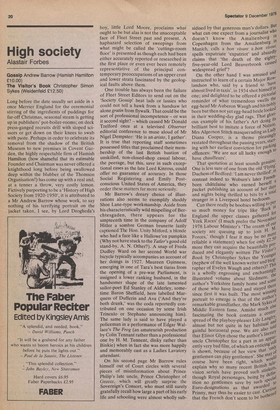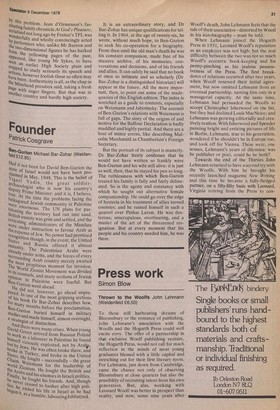High society
Alastair Forbes
Gossip Andrew Barrow (Hamish Hamilton. £10.00) The Visitor's Book Christopher Simon Sykes (Weidenfeld E12.50) Long before the date usually set aside in a once Merrier England for the ceremonial stirring of the ingredients of puddings for far-off Christmas, seasonal' steam is getting up in publishers' pot-boiler-rooms; on deck press-ganged recruits drill with sloped scissors or get down on their knees to swab with paste. Perhaps in order to celebrate its removal from the shadow of the British Museum to new premises in Covent Garden, the highly respectable firm of Hamish Hamilton (how shameful that its estimable Founder and Chairman was never offered a knighthood long before being swallowed deep within the blubber of the Thomson Organisation!) has come up with a real and, at a tenner a throw, very costly lemon. Fictively purporting to be a 'History of High Society from 1920-1950', it is attributed to a Mr Andrew Barrow whose work, to say nothing of his terrifying portrait on the jacket taken, I see, by Lord Drogheda's boy, little Lord Moore, proclaims what ought to be but alas is not the unacceptable face of Fleet Street past and present. A haphazard selection of sweepings from what might be called the 'cuttings-room floor' is presented as though each had been either accurately reported or researched in the first place or even ever been remotely representative of the principal contemporary preoccupations of an upper crust and lower strata fascinated by the geological faults above them.
One trouble has always been the failure of Fleet Street Editors to send out on the 'Society Gossip' beat lads or lassies who could not tell a hawk from a handsaw let alone gratin from flywalk. That could be the sort of professional incompetence or was it second sight? which caused Mr Donald Trelford once at a televised Observer editorial conference to muse aloud of Mr Nigel Dempster: 'He is an aristo,I gather'. It is true that reporting staff sometimes possessed titles that proclaimed their membership of the last British bastion of unskilled, non-closed-shop casual labour, the peerage, but this, save in such exceptional cases as the late Lord Kinross, could offer no guarantee of accuracy. In those Social Registering and Emily Postconscious United States of America, they order these matters far more seriously.
Mr Barrow's dreary choice of illustrations also seems to exemplify shoddy Shoe Lane-type workmanship. Aside from his characteristically wild mispelling of Berchtesgaden, there appears for the umpteenth time in the company of Adolf Hitler a sombre German brunette lazily captioned The Hon. Unity Mitford, a blonde who had a face like a Hallowe'en pumpkin (Why not have stuck to the Tatter's good old stand-by, A. N. Other?). A snap of Freda Dudley Ward on her second World war bicycle typically accompanies an account of her doings in 1927. Maureen Guinness, emerging in one of Tara's best tiaras from the opening of a pre-war Parliament, is assigned a lower ranking husband, in the handsomer shape of the late lamented sailor-poet Ed Stanley of Alderley, sometime Baron Sheffield, here labelled Marquess of Dufferin and Ava ('And they're both drunk,' was the coda reportedly contributed on one occasion by some Irish Trinculo or Stephano announcing him). The same lady is said to have played a policeman in a performance of Edgar Wallace's The Frog (an amateurish production by Cohn Tennant rather than a professional one by H. M. Tennent, dinky rather than Binkie) when in fact she was more happily and memorably cast as a Ladies Lavatory attendant.
On his second page Mr Barrow rules himself out of Court circles with several, pieces of misinformation about Prince Philip's late uncle, Prince Christopher of Greece, which will greatly surprise the Sovereign's Consort, who must still surely gratefully recall how large a part of his early life and schooling were almost wholly sub Spectator 9 December 1978 sidised by that generous man's dollars. But what can one expect from a journalist wh.° doesn't know the Amalienborg 1.11 Copenhagen from the Amalienburg ill Munich, calls a bon vivant a bon viva', spells expatriate 'expatrioe and absurdlY claims that 'the death of the eighq; five-year-old Lord Beaverbrook cause' widespread grief'? On the other hand I was amused and instructed to learn of a certain Major Ruw". landson who, said by a friend to almost lived in taxis', in 1934 shot himself la one; and delighted to be offered a pictorial reminder of what tremendous swells the egg-head Mr Auberon Waugh and his nobly born but then not yet egg-head bride looke.cl in their wedding-day glad rags. That gl0l. ous example of his father's Art doing Its brilliant best to imitate a force of Natal' Mrs Algernon Stitch masquerading as DI Diana Cooper, is a theme plea sing restated throughout the passing years, sta,rting with her earliest conviction for parlcultng offences: 'We are not all lucky enough have chauffeurs'. That quotation at least sounds genuhle; One is less sure of one from the old Duchess of Bedford: 'lam never thrilled , contrast indeed to Woburn's later Freuellborn chatelaine who earned her 3 packet publishing an account of her daYasi and nights being thrilled to bits by a wt stranger in a Liverpool hotel bedroom. „ Can there really be boobies willing to pi!Y so much money for tripe like 'Back le England the upper classes gathered f°1; York Races' (I much prefer the Novmhber 1978 Labour Minister's 'The cream of °me society are queuing up to join 14. r; Forces,' though I fear it may be no 1050 reliable a statement) when for only more they can acquire the beautifullyPr duced and elegantly written The Visit°cr Book by Christopher Sykes the Your!g;. (nephew of the well known writer and " rapher of Evelyn Waugh and others)?."7„ is a wholly engrossing and enchantiugh'e illustrated volume about Sledmere, author's Yorkshire family home and ..,..s°fre of those who have lived and stayed since first it was built. The most withill"rs portrait to emerge is that of the auth°1:4 remarkable grandfather, the Mark SYlcesi'se Middle Eastern fame. Amidst much etre' , fascinating the book contains a censpread of the playboy-pleaser Lily LangtrYci almost but not quite in her habitual arlid gainful horizontal pose. We are also tory that Elinor Glyn chose the author's literal... uncle Christopher for a part in an alWatill ently very bad film, of which an enticing is shown, because of her view that '0110'if gentlemen can play gentlemen'. She mId course have been right, which vile, explain why so many recent British kefirrNis, vision serials have proved such sth; though Royal personages, being bY ue jai ition no gentlemen save by Euro-designations as that r such sP awa -e ‘,11 ije.c to Prinny, may thus be easier to cast. Curl-ed that the French don't seem to be bother by this problem. Jean d'Ormesson's fascinating family chronicle At God's Pleasure, serialised not long ago by France's TFI, was Wonderfully and wholly convincingly acted by Performers who, unlike Mr Barrow and the two-dimensional figures he has hacked from the yellowing pages of the past, aPPeared, like young Mr Sykes, to have seen an earlier High Society plain and Stopped to study seriously its speech and actions however foolish these so often may have been. the Authenticity is all, as the chap in Minehead pressbox said, taking a fresh Page with eager fingers. But that was in another country and hardly high society.
1111.11111.1.1.110=•■•■■=m















































 Previous page
Previous page